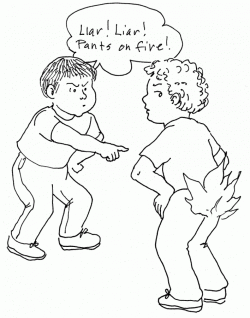Outright lie: By any other name, it's not so bad
Q. When might an outright lie feel like something less than fibbing or prevarication? –G. Washington
A. When you're able to get away with calling it "terminological inexactitude," as did Winston Churchill when he coined the phrase and warned fellow Parliamentarians about its risk, says Ralph Keyes in Euphemania. In time, his phrase became a popular euphemism for "a lie." Some years later, Britain's Cabinet Secretary Sir Robert Armstrong created an uproar by admitting he'd been "economical with the truth" when testifying in a court case.
Men in particular try to avoid giving other men the opportunity to say, "You callin' me a liar?" which can get fists flying– or worse. According to the Oxford English Dictionary, the term "liar" is "normally a violent expression of moral reprobation, which in polite conversation tends to be avoided.
Little wonder there's such a demand for euphemisms and so many to choose from. Rather than accepting lying as a fact of life, we "manipulate" notions of truth, or "massage" the truth, or "sweeten it." "Credibility gap" and "humbug" are golden oldies, as are "stonewall," "trim," "whitewash." Lies can be "factually flexible fictions," "alternative realities," "untruths." A liar can be someone who is "in denial," or suffering from "fictitious disorder syndrome," or as one psychiatrist put it, "A liar is someone for whom truth is temporarily unavailable."
Q. Who invented the cellphone and when and where? –A. G. Bell
A. Martin Cooper, then an engineer at Motorola, invented the first hand-held cellphone in 1973, says ScienceIllustrated.Com magazine. The model weighed over two pounds and had many thousands of component parts squeezed in. (As late as 1983, a portable hand-held phone cost about $4,000.) Standing on a Manhattan sidewalk, Cooper placed his first call to his rival, Joel Engel, whose team was also trying to invent a mobile phone for Bell Labs.
"As I walked down the street talking on the phone," he remarked, "sophisticated New Yorkers gaped at the sight of someone actually moving around while making a phone call. Remember that in 1973, there weren't cordless telephones, let alone cellular phones. I made numerous calls, including where I crossed the street while talking to a New York radio reporter– probably one of the more dangerous things I have ever done in my life."
Q. As U.S. Air Force Captain Chuck Yeager described it, "The ride went smooth as a baby's bottom. Grandma could have been sitting up there sipping lemonade." What was the historic occasion? –T. Wolfe
A. After WWII, Yeager volunteered to find out what would happen if a plane flew faster than sound (known as Mach 1), says Shawn Connolly in The Book of Potentially Catastrophic Science. Would it hit an "air wall" and be smashed into smithereens? Would some outer limit of human endurance be reached, causing eardrums to burst and brains to turn literally to mush?
Two days before the flight, Yeager broke two ribs in a horse fall, but afraid of a cancellation, told no one about his injury. So on October 14, 1947, in the skies above California's Mojave Desert, he boarded a B-29 bomber with the Bell X-1 rocket plane affixed underneath. At 20,000 feet the X-1 was released, which Yeager took to 45,000 feet before stepping up its speed. When it exceeded 670 mph– the speed of sound at that altitude– people on the ground miles below heard the loud boom predicted by scientists.
Yeager brought the plane down smoothly. Afterward, a second generation X-1 was developed capable of Mach 2; by 1955, planes were flying at Mach 3. At Mach 4, however, the fuselage gets too hot for a pilot to control, says Connolly, "with the potential for catastrophe extremely high."
~
Send Strange questions to brothers Bill and Rich at
